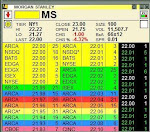I have seen people from many walks of life give an earnest attempt at learning to trade for consistent profits. Some have made it, but many have failed. Doctors, Lawyers, Athletes, Entrepreneurs, Pilots, Scientists, and Engineers have long struggled to make a transition from their successful field to trading for consistent profits. The road is littered with many of these people who honestly took the same approaches that helped them in their prior respective careers. So what went wrong? Why is successful trading so elusive to these intelligent people?
Author Mark Douglas (“Trading In The Zone”) correctly points out that the business of successful trading is in itself a paradox. In other words, it often times does not make sense. The structures and disciplines of prior careers do not translate well into profitable trading. Good traders know when to sit on their hands (Entrepreneurs?). Good traders know how to quickly admit they are on the wrong side and quickly jump to the other side (Lawyers?). Good traders know that the market is ever-changing and cannot be quantified on a constant basis (Engineers, Pilots, and Scientists?) Without even knowing it, our prior work habits and attitudes may hinder the ability to turn our minds upside down when needed. The markets are truly a paradox and we must remain aware of our past convictions that have become such habit to us.
I would like to add another attribute to this article; Patience.
Patience is so important in trading. Have you ever noticed that paper trading was so easy to have patience? But for some reason, once hard earned money was introduced to your trading, patience became a whole lot more difficult to master. Getting out of bad trades too soon, only to see them turn and reverse back to highs. Getting out of good trades because they were pulling back, only to see them run back to highs without you. Sound familiar?
The group that attends our Live Service has heard me say this many times: “There are only two things you can control when trading live. The first is your Attitude and the second is your share size". If you are getting shaken out of good trades too early, consider lowering your share size to a level of comfort to withstand bigger wiggles. If you are constantly changing the game plan while in a trade, check your attitude and try to observe yourself trading as a neutral third party watching a good trader stick to his/her plan. These are just a couple of ways to help you develop more patience while trading your live account. Since you cannot control price action itself, stick to the things you can control.
Happy Trading.
-Steve
Sunday, August 10, 2008
Subscribe to:
Post Comments (Atom)







No comments:
Post a Comment